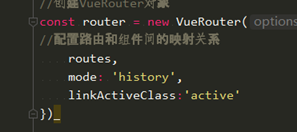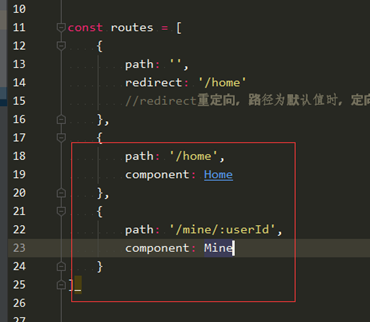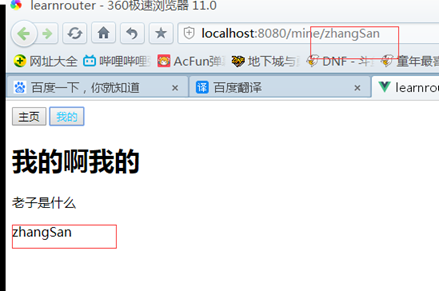发表于: 2019-12-18 22:53:38
1 1493
今天完成的事情:
1.继续学习vue
明天计划的事情:
1.推进任务,学习vue
遇到的问题和收获:
1.路由的默认路径
刚进入页面时,需要直接显示主页,而不是点击后才显示,所以可以多添加一个映射关系。
使用redirect重定向,当进入页面,路径为缺省值时,定向到/home
{
path:'',
redirect:'/home'
//redirect重定向,路径为默认值时,定向到/home
}

改变路径的方式有两种
url的hash,HTML5的history
默认路径改变是通过哈希值,可以更换为html history。
const router=new VueRouter({
//配置路由和组件间的映射关系
routes,
mode:'history'
})
在router里声明模式mode为history

router-link
里面的to属性可以指定跳转路径。
tag属性可以指定router-link之后渲染成什么组件,比如
<router-link to="/home" tag="button">主页</router-link>
可以渲染成按钮。
replace属性加入后,点击按钮跳转时,就不能使用浏览器的返回了
<router-link to="/home" tag="button" replace>主页</router-link>
按钮激活时active的名字可以修改

使用active-class可以修改激活后的名字
<router-link to="/home" tag="button" replace active-class="active">主页</router-link>

如果有多个标签想要修改这样的属性。可以在index.js里的router添加linkActiveClass属性
const router = new VueRouter({
//配置路由和组件间的映射关系
routes,
mode: 'history',
linkActiveClass:'active'
})
路由代码跳转
比如上面不想用router-link,直接用普通标签。
<button @click="linkHome">AAAA</button>
<button @click="linkMine">BBBB</button>
export default {
name: 'App',
methods: {
linkHome() {
this.$router.push('/home')
},
linkMine() {
this.$router.push('/mine')
}
}
}
则需要在方法中添加this.$router.push或者this.$router.replace。replace不能进行返回。
动态绑定
比如给一个动态的id
在index.js里,routes在/mine后面加上/:useId
{
path: '/mine/:useId',
component: Mine
}
在App.vue输出里面增加数据
data() {
return {
userId: 'zhangSan'
}
}
将数据返回给router-link,使用v-bind绑定,’’内作为一个字符串
<router-link :to="'/mine/'+userId" tag="button" replace>我的</router-link>
还想设置一个参数,获取到动态id时,显示在文本里
computed: {
userId() {
return this.$route.params.userId
}
}
$router可以调用push、replace等方法,它是index.js里面拿到的router对象。

$route是当前哪个路由处于活跃状态,拿到的就是哪个路由

再使用它
<p>{{userId}}</p>
params,参数parameters的缩写。userId是根据路径后面的命名来的

路由的懒加载
即使用到时再加载。当打包构建应用时,js包会变得非常大,影响页面加载。
将不同的路由对应的组件分割成不同的代码块,然后当路由被访问的时候才加载对应组件,这样就非常的高效。
// import Home from "../components/Home";
// import Mine from "../components/Mine";
const Home = () => import('../components/Home')
const Mine = () => import('../components/Mine')
懒加载写法,注释掉的是之前的写法。以后路由的写法都要用懒加载。
好多呀





评论